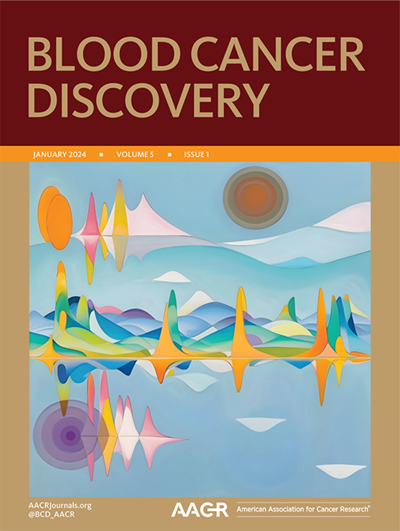Disruption of KLHL6 Fuels Oncogenic Antigen Receptor Signaling in B-cell Lymphoma.
IF 11.5
Q1 HEMATOLOGY
引用次数: 0
Abstract
Pathomechanisms that activate oncogenic B-cell receptor (BCR) signaling in diffuse large B-cell lymphoma (DLBCL), are largely unknown. Kelch-like family member 6 (KLHL6) encoding a substrate-adapter for Cullin-3-RING E3 ubiquitin-ligase (CRL) with poorly established targets is recurrently mutated in DLBCL. By applying high-throughput protein interactome screens and functional characterization, we discovered that KLHL6 regulates BCR by targeting its signaling subunits CD79A and CD79B. Loss of physiological KLHL6 expression pattern was frequent among the MCD/C5-like activated B-cell DLBCLs and was associated with higher CD79B levels and dismal outcome. Mutations in the BTB domain of KLHL6 disrupted its localization and heterodimerization, and increased surface BCR levels and signaling, whereas Kelch domain mutants had the opposite effect. Malfunctions of KLHL6 mutants extended beyond proximal BCR signaling with distinct phenotypes from KLHL6 silencing. Collectively, our findings uncover how recurrent mutations in KLHL6 alter BCR signaling and induce actionable phenotypic characteristics in DLBCL.KLHL6的破坏助长了B细胞淋巴瘤的致癌抗原受体信号传导
弥漫大B细胞淋巴瘤(DLBCL)中激活致癌B细胞受体(BCR)信号传导的病理机制在很大程度上尚属未知。Kelch样家族成员6(Kelch-like family member 6,KLHL6)编码Cullin-3-RING E3泛素连接酶(CRL)的底物适配器,其靶点尚未明确,在DLBCL中反复发生突变。通过应用高通量蛋白质相互作用组筛选和功能表征,我们发现KLHL6通过靶向其信号亚基CD79A和CD79B来调控BCR。在MCD/C5样活化B细胞DLBCL中,KLHL6生理表达模式的缺失很常见,并且与CD79B水平升高和预后不良有关。KLHL6的BTB结构域突变破坏了其定位和异源二聚体化,并增加了表面BCR水平和信号传导,而Kelch结构域突变体则具有相反的效果。KLHL6突变体的功能障碍超出了近端BCR信号转导,其表型与KLHL6沉默不同。总之,我们的研究结果揭示了KLHL6的复发性突变如何改变BCR信号转导并诱导DLBCL的表型特征。
本文章由计算机程序翻译,如有差异,请以英文原文为准。
求助全文
约1分钟内获得全文
求助全文
来源期刊

Blood Cancer Discovery
Multiple-
CiteScore
12.70
自引率
1.80%
发文量
139
期刊介绍:
The journal Blood Cancer Discovery publishes high-quality Research Articles and Briefs that focus on major advances in basic, translational, and clinical research of leukemia, lymphoma, myeloma, and associated diseases. The topics covered include molecular and cellular features of pathogenesis, therapy response and relapse, transcriptional circuits, stem cells, differentiation, microenvironment, metabolism, immunity, mutagenesis, and clonal evolution. These subjects are investigated in both animal disease models and high-dimensional clinical data landscapes.
The journal also welcomes submissions on new pharmacological, biological, and living cell therapies, as well as new diagnostic tools. They are interested in prognostic, diagnostic, and pharmacodynamic biomarkers, and computational and machine learning approaches to personalized medicine. The scope of submissions ranges from preclinical proof of concept to clinical trials and real-world evidence.
Blood Cancer Discovery serves as a forum for diverse ideas that shape future research directions in hematooncology. In addition to Research Articles and Briefs, the journal also publishes Reviews, Perspectives, and Commentaries on topics of broad interest in the field.
 求助内容:
求助内容: 应助结果提醒方式:
应助结果提醒方式:


